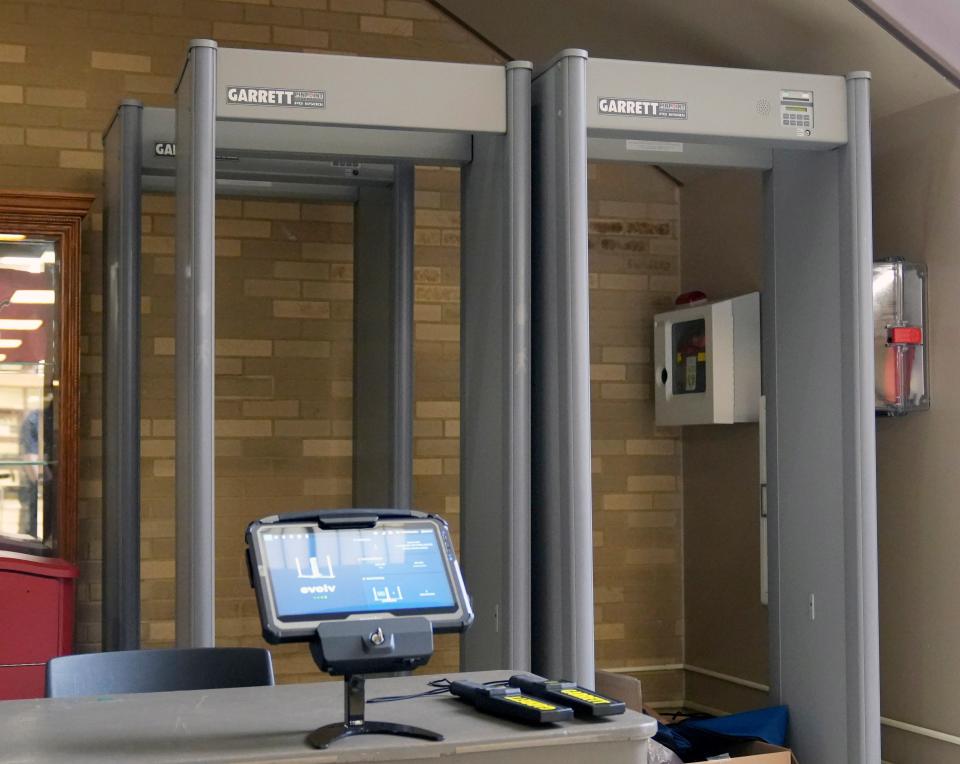Experts: Columbus City Schools’ new misguided security screenings won’t keep students safe

Margaret Stevenson is associate professor of psychology at Kenyon College and president of the American Psychological Association's Division 37's Child and Family Policy and Practice, Section on Child Maltreatment.
Ar’Reon Watson is a doctoral student in school psychology at Louisiana State University, and a National Science Foundation Graduate Research Fellow.
Columbus City Schools recently announced district-wide enhanced security measures, including mandatory student bag screenings at the beginning of the school day, daily random bag screenings, and screenings involving metal detector devices.
The heightened security measures come in the wake of a recent school stabbing at Mifflin High School.
More: Stop and frisk? CCS discounts 'rumors' as misinformation as tensions flare at meeting
More: Columbus schools beefing up security at high schools after student stabbed at Mifflin High
It's well past time schools recognized that these measures stand to harm children more than help.
Research regarding whether school security practices enhance student safety is at best mixed, with many studies showing null effects. Specifically, hand-held metal detectors are largely ineffective in reducing rates of violence, theft, or victimization at schools.

They also fail to enhance students’ perceptions of safety. Consequently, the National Association of School Psychologists opposes such security measures, arguing that they undermine student learning without increasing children’s safety.
Crucially, children of color stand to be disproportionately harmed by additional bag screenings. With screenings come subjective discretion by staff and school resource officers, which ushers in opportunities for well-documented racial bias in encounters with students.
Of course, some students will make mistakes – they’ll “back-talk” or bring questionable (but harmless) items to school. But more screenings create more opportunities for criminalizing normal adolescent behavior, particularly for Black students.
White student or Black student test?
For instance, in our own research, we recruited teachers and presented them with a scenario in which a school resource officer used physical force (a takedown and a chokehold) against a student fighting at school. But, we randomly assigned half of the teachers to believe the student was Black, while the other half believed he was white.
Teachers were more likely to support punishment and even criminal arrest when they thought the student was Black than when they thought he was white, even though we changed nothing else about the scenario except for the student’s race.
Understandably, there is broad public support for preventing and addressing school-based violence. Yet, ensuring school safety requires prioritizing not just physical well-being, but also psychological and emotional well-being.
Notably, CCS’s proposed security policy stands in opposition to state legislation requiring Ohio schools to implement schoolwide Positive Behavioral Interventions and Supports, a framework for student preventative supports and behavioral interventions that research shows does reduce school violence.
What will protect students?

We call on CCS officials to incorporate school security measures within an equity-focused Positive Behavioral Interventions and Supports framework. Fortunately, an excellent model for doing this already exists.
Various schools have successfully emphasized equity within their Positive Behavioral Interventions and Supports framework and it reduced racial inequity in their schools’ discipline outcomes.
We urge CCS to resist knee-jerk reactions to incidents of school violence with school security measures that are ineffective at best and harmful at worst. CCS should instead emphasize wholistic approaches that strengthen student mental health and well-being, as supported by Ohio Department of Education’s Whole Child Framework.

Should the CCS retain the misguided practice of additional student bag screenings, they must be proactive in preventing racial discrimination in experiences and outcomes stemming from these screenings.
To that end, we urge all CCS schools to create continuous professional learning opportunities that center racial equity and anti-racist practices when identifying solutions to promote safe school environments.
By prioritizing these measures, we can more effectively protect students.
Margaret Stevenson is associate professor of psychology at Kenyon College and president of the American Psychological Association's Division 37's Child and Family Policy and Practice, Section on Child Maltreatment.
Her research interests involve applying social psychology toward understanding miscarriages of justice within legal systems that predominantly affect disadvantaged populations, and are reflected in her recently published Oxford University Press book, "The Legacy of Racism for Children: Psychology, Law, and Public Policy."
Ar’Reon Watson is a doctoral student in school psychology at Louisiana State University, and a National Science Foundation Graduate Research Fellow.
This article originally appeared on The Columbus Dispatch: Will Columbus City Schools’ new security screenings keep students safe?

 Yahoo Autos
Yahoo Autos 